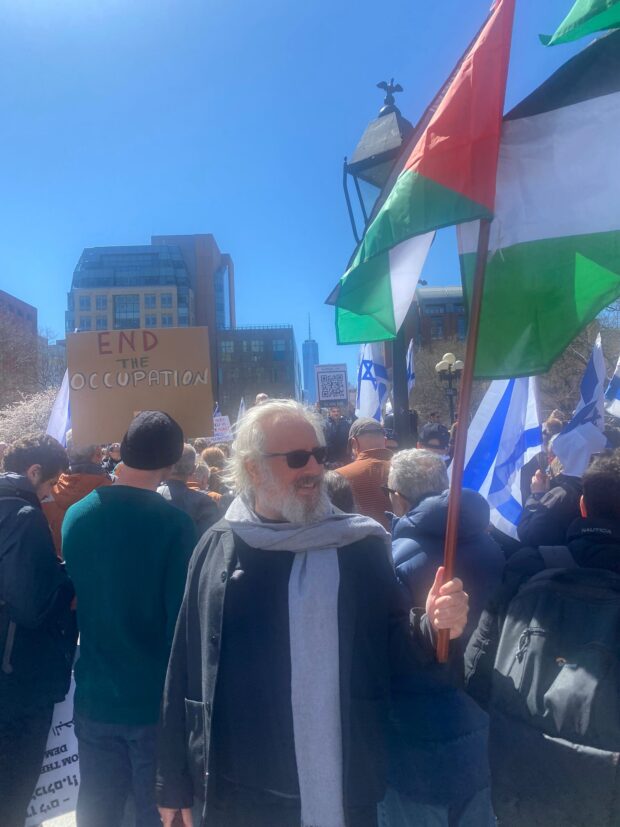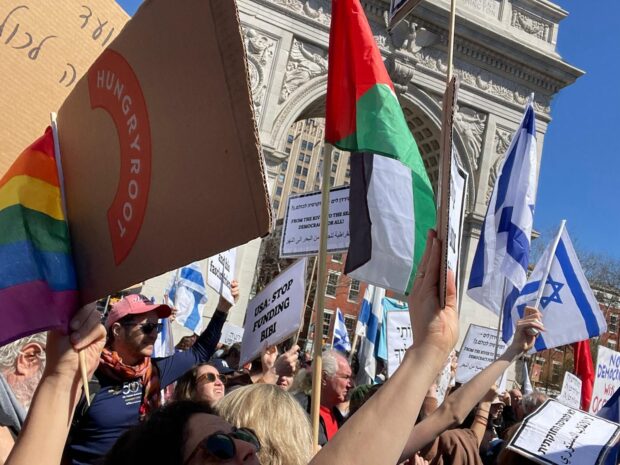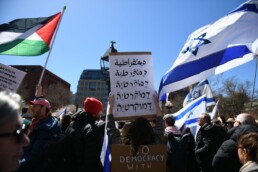Amid Protests Against Israeli Judicial Reforms, Some American Jews Shift Focus to Occupation
On a recent Sunday, amid a sea of blue and white Israeli flags waving at a Washington Square Park protest against legislation in Israel to undermine the country’s judiciary, a handful of tricolor Palestinian flags stood out.
Among the dozen people who marched with the Palestinian flag was Udi Aloni. A Tel Aviv native, Aloni is a filmmaker who has advocated since he was a teenager for the end of the Israeli presence in the West Bank, the Gaza Strip, and East Jerusalem. For him, fighting for democracy just for Israeli Jews isn’t enough.
“This flag has never been about equality,” he said of the Israeli flags that dominated the rally. “It’s only about equality for Jews, so this flag for me is very problematic.”

Since January, Israelis in large numbers have protested the government’s plan to overhaul the judicial system. The reform, pushed by the new far-right government, has led to a massive backlash in Israel, where thousands of Israelis have taken to the streets. The legislation also threatens the relationship of the Jewish state with American Jews, many of whom also oppose the right-wing tilt of the government.
In New York, protests have been held weekly in the shadow of Washington Square Park’s magnificent arch, coordinated on a 200-person WhatsApp group where activists share tips and announce speakers. Recently, another group has emerged. This splinter-conversation, which includes nearly 80 people, gathers those who think the occupation of Palestinian territories should also be a part of discussions. They hope the growing dissent against the Israeli government will be the first step to a wake-up call regarding the country’s presence in the Palestinian territories since the 1967 war.

The anti-occupation message is not always welcome at the Washington Square rallies. A few weeks ago, Peter Beinart, a former Zionist who now advocates for a bi-national state, was booed off the rally stage when he started advocating for Palestinian rights. One rally participant recalled people screaming. “It isn’t the right time for this.”
Since the anti-government demonstrations began, protesters have employed the Israeli flag as a symbol of democracy. From New York to Tel Aviv to Israeli settlements in the West Bank considered illegal under international law, the Star of David flag has unified Jewish protesters from different backgrounds. The reform, which has recently been put on pause by the government, is rejected by most Israelis, polls show. Some military reservists, who are essential to Israel’s security, even threatened to stop reporting for duty if the reform was passed. For the pro-democracy side, embracing the flag was a way to reclaim this symbol mainly used by right-wing settlers.
Still, the first time Karin Loevy went to the Washington Square protests, she found herself uncomfortable standing around all these white-and-blue flags. Like the other members of the anti-occupation WhatsApp group, Loevy believes this political crisis offers an occasion to address other undemocratic aspects of the Israeli state.
“For many Palestinians, this flag stands for this long-lasting reality of dispossession. When a Palestinian sees an Israeli flag, especially in this amount, it raises in him the opposite idea of democracy.” This, she said, might explain why few Palestinians join the anti-government rallies in Israel and in New York.
The fight for democracy and the struggle against the occupation are closely linked, Loevy said. She also wrote it down in capital black, green, and red letters on a white cardboard sign: “No Democracy without occupation! Stop apartheid now.”
The term apartheid, a system of institutionalized racial segregation in South Africa from 1948 to the 1990s, has been applied to Israel’s treatment of the Palestinians by the former UN special rapporteur on human rights in Palestinian territories, Michael Lynk. He used it to describe the “dual legal and political system that privileges the 700,000 Israeli Jewish settlers living in the 300 illegal Israeli settlements.” This disputed term is also used to describe the dual reality in which Palestinian and Israeli settlers live within the West Bank, referring, for example, to the existence of a dual highway system.
In a picture taken before the Washington Square Arch, Loevy poses proudly with other Palestinian flag wavers. “USA stops funding Bibi and his fascist friends,” read a sign. (Bibi is short for Benjamin Netanyahu, Israel’s prime minister at the head of the new far-right government.)
Like in the picture, the anti-occupation protesters often stick together, creating a halo of tri-color flags in the protest. What seems anodyne in New York is now banned in Israel after the far-right national security minister, Itamar Ben-Gvir, enforced the prohibition of Palestinian flag-flying in public places. Despite the bill, Palestinian flags can also be seen at anti-government protests in Israel at the hands of anti-occupation protesters.
Waving a Palestinian flag isn’t illegal at New York protests, however those who dare to do so aren’t always received with open arms.
On March 27, a day after Israel’s consul general in New York, Asaf Zamir, resigned in protest over the judicial reform plans, Aloni showed up at a separate demonstration at the Israeli consulate on Second Avenue with a large Palestinian flag tied to the top of a long wooden stick. As protesters marched holding signs with messages like “American Jews wake up” and “DEMOCRACY!” Aloni walked behind them, proudly waving his banner. For about an hour, he paraded in silence under the rain, sparking no other reactions than a few glances.
“I didn’t know if I was a hero or pathetic,” he recalled, laughing. These mild reactions were nothing compared to the turmoil his gesture provoked a few months ago at the Washington Square protest.
“The first time, it was cool. The second time, people were very aggressive,” he said. “They were screaming at me… They almost beat me.” When Aloni unfurled his flag, some other demonstrators asked him to pull it away. Some even said that it would alienate the more centrist and right-wing protesters.
Among those who witnessed the confrontation was Rabbi Misha Shulman, who was born and raised in Israel and now works for the New Shul, a New York-based progressive community that aims to celebrate Judaism through spiritual and cultural events. “It was a very demoralizing moment. For me, the main reason to protest is because (the reform) it’s going to make Palestinians in the West Bank suffer much more than they’re already suffering,” he said.
Shulman recalled that the day of the rally he couldn’t decide what message to wear on his jacket. A half-Palestinian half-Israeli flag? He opted for a toned-down, “Jews and Arabs refuse to be enemies” sign. Shulman was torn between wanting to resist the newly enforced Palestinian flag ban in Israel and his concerns about not alienating his fellow protesters.
But Shulman actually prefers to protest in Israel, which he said felt more “radical” than in New York, where protests were less attended and the stakes were lower. He recalls his feelings of belonging when attending a demonstration in Jerusalem the night Netanyahu fired the defense ministry over criticism of the judicial plan.
“For me, a protest is a type of prayer, and prayer has to be full, real, and pure. So I could say those words and feel like a proper, included participant,” he said.
Growing up in Jerusalem in the 1980s, Shulman learned about Israel as a nation making genuine efforts to achieve peace with its neighbors. His awakening about the reality of occupation has been a long process punctuated by many events. Among them was his military service in the Israeli Defense Force (IDF) in Southern Lebanon from 1996 to 1999, an area occupied by Israel from 1985 to 2000. There he observed the toll of the Arab-Israeli conflict on the local population.
Aloni describes a more brutal process when discussing what he called his unlearning process about Israel. In the late 1990s, he met with Israeli Arab intellectual Azmi Bishara—a decisive encounter. Born in Nazareth, a city populated mainly by Arab Israelis, Bishara founded the Balad party. This Arab political party advocates for Israel to be a binational rather than a Jewish state.
“I think he totally deconstructed my ideological glasses. In a way, he broke them. We all, Israeli Jews, we grew up with them, but we kept it,” explained Udi, who now defines himself as an Israeli Jew who fully supports Palestine. He is also an advocate of a binational state.
The place of Arabs in Israel is a question that divides Israeli, 48% thought “Arabs should be removed from Israel,” according to a 2016 Pew Research Center survey. The “Land for Peace” approach, giving up land for peace, has been the basis of peace agreements since the 1970s. Over the years, the idea that the government should advance the two-state solution has received less support from Israeli Jews (from 44% to 31%) and seems unattainable now that the country controls 61% of the Palestinian territories.
According to a survey from the Israel Democracy Institute, only 32% of Israeli Jews supported a peace agreement between Israel and the Palestinian Authority in 2022.
Aloni, who is now used to heated discussions when he tries to approach the mic holding his Palestinian flag, says it doesn’t matter. Showing up with it is already a good start and a strong symbol. And if the number of flags in the crowd is any indication, support for the anti-occupation cause seems to be growing. “A few weeks ago, there was only one flag,” he said.
He hopes that his presence at these rallies, where only a few questioned Israel’s policy in Palestinian territories, could be the first step to an unlearning process about the occupation.
“I want to be a part of the co-resistance in a dream that will have coexistence at the end,” he added.

